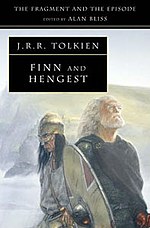Finn and Hengest

Book cover of the 1998 Firebird Distributing paperback edition
|
|
| Editor | Alan J. Bliss |
|---|---|
| Author | J. R. R. Tolkien |
| Country | United Kingdom |
| Language | English |
| Subject | Finn and Hengest in a historic context |
| Genre | Literature analysis |
| Publisher | George Allen & Unwin |
|
Publication date
|
1982 |
| Media type | Print (hardback and paperback) |
| Pages | 192 (paperback) |
| ISBN | |
| Preceded by | Mr. Bliss |
| Followed by | The Monsters and the Critics, and Other Essays |
Finn and Hengest is a study by J. R. R. Tolkien, edited by Alan Bliss and published posthumously in book form in 1982.
Finn and Hengest are two Anglo-Saxon heroes appearing in the Old English epic poem Beowulf and in the fragment of "The Fight at Finnsburg". Hengest has sometimes been identified with the Jutish king of Kent. He and his brother Horsa (the names meaning "stallion" and "horse") were the legendary leaders of the first Anglo-Saxon immigrants to Britain as mercenaries in the 5th century.
The book is based on an edited series of lectures Tolkien made before and after World War II. In his lectures, Tolkien argued that the Hengest of "The Fight at Finnsburg" and Beowulf was an historical rather than a legendary figure and that these works record episodes from an orally composed and transmitted history of the Hengest named in the Anglo-Saxon Chronicle. This view has gained acceptance from a number of medieval historians and Anglo-Saxon scholars both since Tolkien's initial lectures and since the publication of this posthumous collection.
Tolkien's lectures describe what he called the "Jutes-on-both-sides theory", which was his explanation for the puzzling occurrence of the word ēotenas in the episode in Beowulf. Tolkien read the word as Jutes, and theorised that the fight was a purely Jutish feud, and Finn and Hnæf were simply caught up by circumstance. Tolkien explained both their presence and their ambiguous loyalty with his interpretation of the story.
Hnæf, son of Hoc Half-Dane, is the lord of a Danish people who have conquered part of Jutland (probably the northern part of the Cimbrian Peninsula) and exiled its former Jutish rulers. Finn, king of Frys-Land (modern-day Friesland in the Netherlands) has allowed dispossessed Jutes to settle in his lands and enter his service. Finn marries Hnæf's older sister Hildeburh, and sends their son (whose name was probably Friðuwulf) to be fostered in Hnæf's household.
...
Wikipedia
